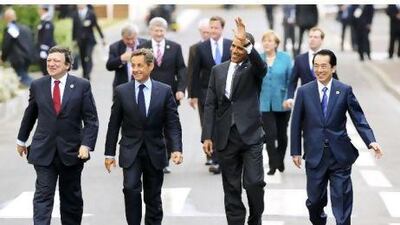DEAUVILLE // The latest Group of Eight summit was "historic", the moment for the great powers to rally their wealth and arms behind the Arab people and staunch a gap in the spread of "western" values across the world.
Or was it a pointless, costly absurdity, a vanity project for leaders of nations in decline, marginalised by the rise of China and other big, industrialising nations, for whom the forum founded in the 1970s is a neo-colonial throwback?
Some answers in that debate should emerge in the coming year when France, proud host of a summit in Deauville, hands the chair to the United States, where officials have been sceptical of the group's utility.
The White House has not set a date for the 2012 G8 summit; it may all but merge into the Group of 20, which brings in China, India, Brazil and others and became Washington's favoured global forum after President Barack Obama's predecessor George W Bush hosted the first G20 summit three years ago.
On Friday, however, after 24 hours of talk on the Normandy coast, it seemed US attitudes to the smaller G8 might have been warmed by a summit that offered big credits to new Arab democracies and rallied Russia, an often awkward post-Cold War addition, to the cause of ousting Libya's Muammar Qaddafi.
"This has actually been quite a good G8 and in many respects it has underscored what is best about the G8," a senior official in the administration said. "We are strong proponents of the G20 as the premier forum for international economic co-ordination. But there is something about the G8 and a small group of leaders who deal with each other across a wide range of issues on a very regular basis. It builds a strong relationship with them and it really came out here."
The G8's critics are far from convinced. "The Deauville summit is a monumental waste of time and money," the British commentator Timothy Garton Ash wrote in the British daily The Guardian. "If the G8 did not exist today, no one would dream of inventing it. Its core business, the management of the global economy, cannot properly be discussed without the presence at the top table of countries like China, India and Brazil."
Mr Obama should focus on merging the G8 into the G20 and improving the functioning of that newer, larger forum, Mr Garton Ash said.
Yet among admirers, John Kirton of the University of Toronto, whose G8 Research Group tracks the forum's effectiveness, said it was needed "now more than ever". He compared its aid for Egypt and Tunisia to its role in Europe after the fall of the Berlin Wall.
"If there was ever a time for the G8 after the post-Cold War victory it was now, and the Deauville summit got the job done," he said. "This is as transformational and historic as that."
The calendar of the coming year's events may be revealing.
The French president Nicolas Sarkozy, for whom such gatherings are welcome platforms as he campaigns for re-election, has set this year's G20 for Cannes in November, six months after the G8.
Mr Obama may prefer a G8 that is essentially a preparatory caucus for the G20 summit to held in Mexico - last year Canada hosted both G8 and G20 summits on succeeding days.
Heather Conley, the director of the Europe programme at Washington's Center for Strategic and International Studies, said before Deauville: "I was surprised that the [US] president did agree to two visits to France this year. But I think you'll see perhaps the same difficult decision next year - should we do a formal G8 summit?" she added, pointing to discomfort among European leaders at their diluted weight in the G20.
"We're in this, I fear prolonged, transition period," Ms Conley said, "where the G8 doesn't feel like it's got the right combination but the G20 has not matured into a coherent body."
One senior European official at Deauville conceded: "If you really want to make something happen in the world, you have to go to the G20." But, the official added, the G8 was a less formal "club of friends" where leaders spoke more freely. "It still has a role," he said.
The world has changed dramatically since the group began. France hosted the first summit 36 years ago, when its former president, Valery Giscard d'Estaing, invited peers from the US, Japan, Britain and West Germany to Rambouillet to seek consensus on surging global capital flows and soaring oil prices.
Once Italy and Canada had joined by the next year, 1976, the G7 accounted for two thirds of the world's economic output. Even with Russia, added in 1998 in hopes of fostering its post-Soviet democracy, the G8 now has only about 40 per cent of world gross domestic product. China's economy has surpassed all but that of the US.
But Daniel Schwanen at Canada's Centre for International Governance Innovation said: "You're talking about very rich countries, with two thirds or more of the military power in the world. That makes it still a credible and viable institution, and one that need not stand in opposition to the G20 at all."
David Bosco, writing for the US magazine Foreign Policy, said: "There is a significant chance that this will be the last major G8 summit meeting. But this forum won't bury itself; the Obama administration will have to make a point of it.
"In the months ahead, the administration will have to weigh whether ending the G8 is worth the diplomatic headache."
